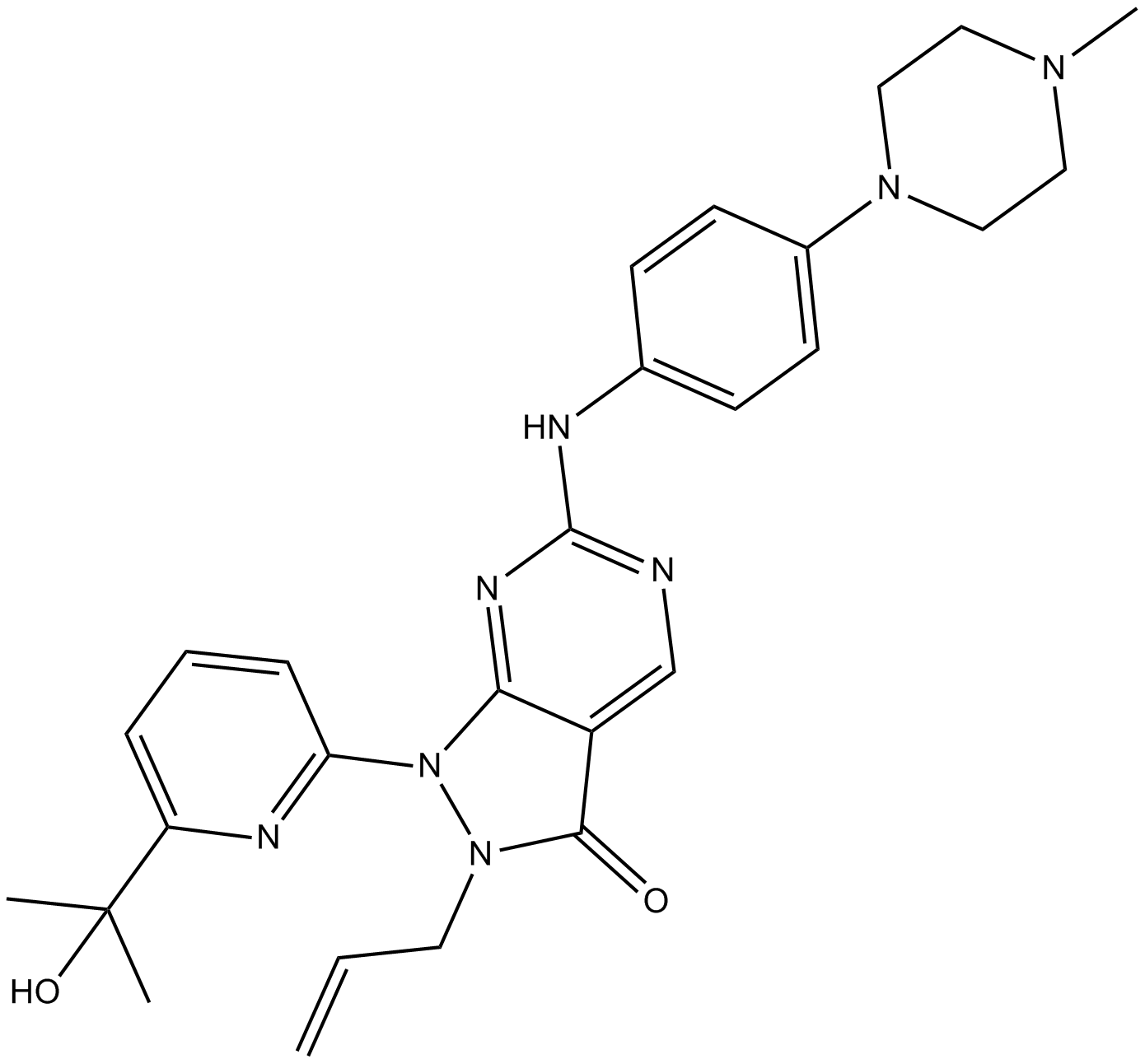MK-1775 (Synonyms: MK1775,MK 1775) |
| Catalog No.GC16030 |
MK-1775 (AZD-1775; MK-1775) is a potent Wee1 inhibitor with an IC50 of 5.2 nM.
Products are for research use only. Not for human use. We do not sell to patients.

Cas No.: 955365-80-7
Sample solution is provided at 25 µL, 10mM.
MK-1775 is a potent and selective small-molecule inhibitor of Wee1 kinase with an IC50 value of 5.2 nM. MK-1775 is 2- to 3-fold less potent against Yes with an IC50 of 14 nM.[1].
In vitro efficacy test it shown that MK-1775 inhibited phosphorylation of CDC2 at Tyr15 with an EC50 value of 85 nM in cells pretreated with gemcitabine. MK-1775 treatment induced pHH3 in a dose-dependent manner with an EC50 value of 81 nM.[1] In vitro efficacy test it indicated that treatment with 10 nM panobinostat in combination with 250 nM or 500 nM MK-1775 in U937 cells, the combination index (CI) values were 0.95 and 0.73, while U937 cells treated with 20 nM panobinostat in combination with 250 nM or 500 nM MK-1775 were 0.39 and 0.40, respectively.[3] In vitro, treatment with 0.1, 0.3, 1 μM of MK-1775 for 48 h in LSCC cells and TU212 and KB-3-1 cells dose-dependently induced early apoptosis (Annexin V+/PI-) and late apoptosis (Annexin V+/PI+) . Moreover, after MK-1775 treatment, the protein levels of apoptosis marker cleaved-PARP was increased in a dose-depend manner[5].
In vivo, treatment with 60 mg/kg MK-1775 orally enhances H1299 xenograft tumor response to fractionated radiotherapy in nude mice.[2] In vivo experiment it indicated that treatment with either MK-1775 (20 mg/kg) or panobinostat (10 mg/kg) alone in mice bearing BxPC-3 xenograft tumors had modest delay of externally measurable tumor growth (30.9% and 37.8% on day 20, respectively). However, combination the MK-1775 (20 mg/kg) with panobinostat (10 mg/kg) can marked delay the tumor growth with 58.7% tumor growth inhibition on day 20.[4] In vivo, Nude Mice were treated with 50 mg/kg orally MK-1775, MK-1775 inhibited the growth of KB-3-1 xenografts with the inhibition ratio of 30.04% by reducing the tumor volumes and weights. And MK-1775 also can cause toxicity in mice at the indicated dose.[6].
References:
[1]Hirai H, et al. MK-1775, a small molecule Wee1 inhibitor, enhances anti-tumor efficacy of various DNA-damaging agents, including 5-fluorouracil. Cancer Biol Ther. 2010 Apr 1;9(7):514-22.
[2]Bridges KA, et al. MK-1775, a novel Wee1 kinase inhibitor, radiosensitizes p53-defective human tumor cells. Clin Cancer Res. 2011 Sep 1;17(17):5638-48.
[3]Qi W, et al. Synergistic anti-leukemic interactions between panobinostat and MK-1775 in acute myeloid leukemia ex vivo. Cancer Biol Ther. 2015;16(12):1784-93.
[4]Wang G, et al. Synergistic antitumor interactions between MK-1775 and panobinostat in preclinical models of pancreatic cancer. Cancer Lett. 2015 Jan 28;356(2 Pt B):656-68.
[5]Yuan ML, et al Inhibition of WEE1 Suppresses the Tumor Growth in Laryngeal Squamous Cell Carcinoma. Front Pharmacol. 2018 Sep 28;9:1041.
[6]Yuan ML, et al. Inhibition of WEE1 Suppresses the Tumor Growth in Laryngeal Squamous Cell Carcinoma. Front Pharmacol. 2018 Sep 28;9:1041.
Average Rating: 5 (Based on Reviews and 10 reference(s) in Google Scholar.)
GLPBIO products are for RESEARCH USE ONLY. Please make sure your review or question is research based.
Required fields are marked with *




















